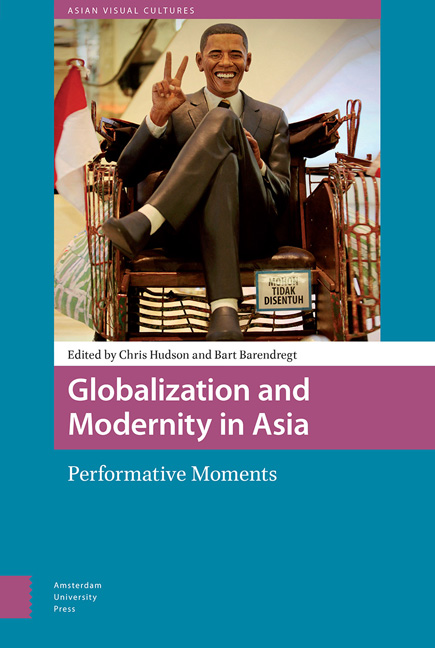Book contents
- Frontmatter
- Contents
- List of Figures
- Acknowledgments
- 1 Global Imaginaries and Performance in Asia
- 2 Globalizing the Imagination: Introductory Reflections
- 3 Weddings, Yoga, Hook-ups: Performed Identities and Technology in Bali
- 4 Super Premium Soft Double Vanilla Rich and the Ideal of Convenience in Japan
- 5 Unearthing the Past and Re-imagining the Present: Contemporary Art and Muslim Politics in a Post-9/11 World
- 6 Keeping Communists Alive in Singapore
- 7 Performative Pedagogies: Lifestyle Experts on Indian Television
- 8 Performing Cities: The Philippines Pavilion at the 2010 Shanghai International Exposition
- 9 Mobile Performance and the In-between: Yogyakarta Comes to Melbourne
- 10 An Islamist Flash Mob in the Streets of Shah Alam: Unstable Genres for Precarious Times
- 11 Pure Love?: Sanitized, Gendered and Multiple Modernities in Chinese Cinemas
- 12 Yogya on Stage
- Index
11 - Pure Love?: Sanitized, Gendered and Multiple Modernities in Chinese Cinemas
Published online by Cambridge University Press: 11 December 2020
- Frontmatter
- Contents
- List of Figures
- Acknowledgments
- 1 Global Imaginaries and Performance in Asia
- 2 Globalizing the Imagination: Introductory Reflections
- 3 Weddings, Yoga, Hook-ups: Performed Identities and Technology in Bali
- 4 Super Premium Soft Double Vanilla Rich and the Ideal of Convenience in Japan
- 5 Unearthing the Past and Re-imagining the Present: Contemporary Art and Muslim Politics in a Post-9/11 World
- 6 Keeping Communists Alive in Singapore
- 7 Performative Pedagogies: Lifestyle Experts on Indian Television
- 8 Performing Cities: The Philippines Pavilion at the 2010 Shanghai International Exposition
- 9 Mobile Performance and the In-between: Yogyakarta Comes to Melbourne
- 10 An Islamist Flash Mob in the Streets of Shah Alam: Unstable Genres for Precarious Times
- 11 Pure Love?: Sanitized, Gendered and Multiple Modernities in Chinese Cinemas
- 12 Yogya on Stage
- Index
Summary
Abstract
This chapter explores through the prism of three highly popular romantic movies Love Is Not Blind (China, 2011), You Are the Apple of My Eye (Taiwan, 2011), and Love in a Puff (Hong Kong, 2010), performances or mediations of what is termed sanitized modernities, modernities that are cleansed from all dirt, pollution and impurity that constitutes the everyday. The movies share the desire to polish the real to a level that it shines, that its surface becomes smooth and touchable, the city transparent, and our movements within it sophisticated and swift. The films articulate different modernities. In Love Is Not Blind, the velocity of the modern, propelling ever more conspicuous consumption, is confronted. This compressed modernity that Chinese youth is currently facing produces both a desire for as well as anxiety over a modern lifestyle. In Taiwan, it is a nostalgia for high school days that is most pertinent, and as such the movie gestures towards the past: youth is being idealized. We are confronted here with what we can term a kawaii modernity, saturated with cuteness, soft-focus shots, and a profoundly romantic structure of feeling. This can be linked to the current political situation of Taiwan as a country that is struggling to retain its position and identity vis-à-vis a China that is gaining power so quickly on the global stage. This predicament is amplified in Hong Kong. Here, we witness a postcolonial anxiety, one that in real life had the Umbrella Movement as its somewhat later political articulation. In the movie we see characters negotiating what we can term a pragmatic modernity, in which young people navigate through the city and quest for their demands by taking over back alleys, by avoiding surveillance and by gaining more space in the private realm, although they ultimately surrender.
Keywords: Chinese cinemas, modernities, purity, romance
Is there hope? Rubbish dump! Is there hope? Rubbish dump!
– He Yong, ‘Rubbish Dump’ (1992)When 25-year-old Yuan Yuan picked me up with his Volkswagen Beetle in 2011 to go for a drink in Beijing, I realized how much had changed in just two decades. The Beetle has now, for some, replaced the bike, bus or the yellow ‘bread taxi,’ the name of the latter referring to its bread-like shape.
- Type
- Chapter
- Information
- Globalization and Modernity in AsiaPerformative Moments, pp. 195 - 214Publisher: Amsterdam University PressPrint publication year: 2018

